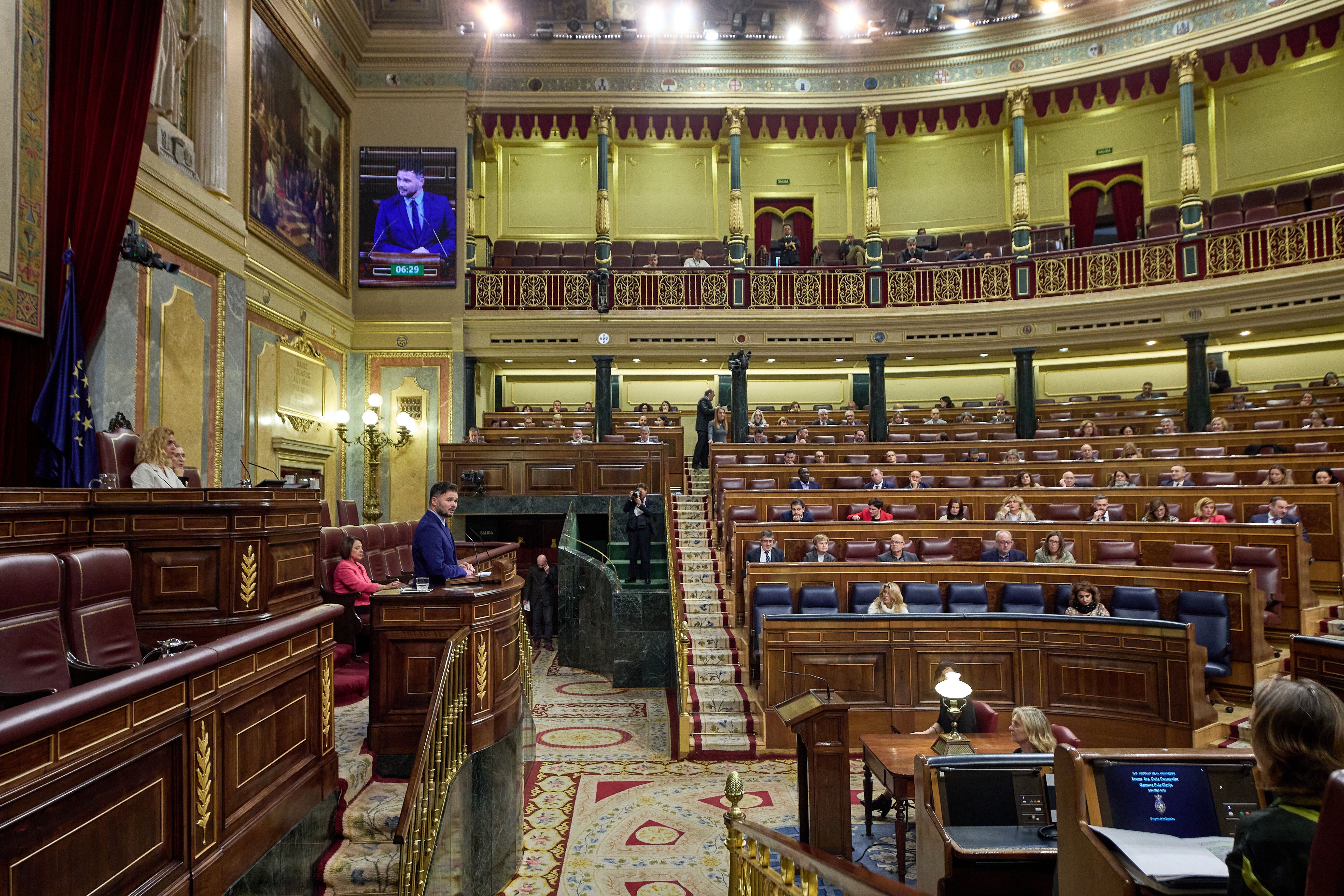Spain's lower house, the Congress of Deputies, has approved the fast-track reform of the country's Penal Code after the Constitutional Court postponed until Monday its final decision on how it will react to the judicial reform promoted by PSOE and Podemos. The Congress has thus given the green light this Thursday to the repeal of the crime of sedition, the reform of misuse of funds and the modification of the rules to renew the Constitutional Court. But now the ball goes back into the Constitutional Court itself, as it will have to decide whether the amendment to the Penal Code to reform the judiciary is constitutional.
"The last time Inés Arrimadas spoke like that to a Speaker of Parliament was to Carme Forcadell, and she ended up in prison." The leader of the Catalan Republican Left (ERC) in the Spanish lower house, Gabriel Rufián, summed up with this sentence something that was easy to perceive this Thursday: the ambience in the Congress closely resembled that of the Catalan Parliament in 2017. Not only because of the intervention of the Constitutional Court in a debate that had not yet taken place, but because of constant comparisons that were made by hard-line Spanish nationalists between what was voted on this Thursday in Madrid and what was approved five years ago in Barcelona, in preparation for the 1st October independence referendum.
Before Rufián's speech, Arrimadas had asserted that this Thursday "what was already endured in September 2017" in Catalonia was now being repeated in the Spanish parliament. "It will be the first time this has happened in Congress, but it is not the first time it has happened in Spain", assured the Ciudadanos (Cs) leader, in addition to making constant comparisons between the government of Pedro Sánchez and that of Carles Puigdemont. In fact, she reproved the Spanish left's complaints about the Constitutional Court's interference: "They use the same arguments that Junqueras and Puigdemont did", he said.
To add further shades of 2017 in Catalonia to the panorama, Vox decided to be absent from this debate. The far-right party's Javier Ortega Smith did speak, but he left the chamber straight after finishing his address, in which he threatened to send MPs "to the dock". As if that wasn't enough, the name of Antonio Tejero came up more than once. Gabriel Rufián said that he was "afraid" that the colonel who led the 23-F coup of 1981 would enter "in a gown", a reference to the Constitutional Court judges. And the spokesperson for the Socialists (PSOE), Felipe Sicilia, also made a comparison between Tejero and the PP, to the indignation of those in the opposition benches.
The PP did remain in the chamber, but chose not to vote, so the vote ended with 249 votes cast, of which 184 were in favour (the same parties who supported the investiture of the Sánchez government), 64 against and one abstention. The People's Party (PP) spokesperson, Cuca Gamarra, affirmed that her party "never abandons the institutions" but affirmed that the PP did not want to take part in a vote that, in her opinion, should never have taken place. Cs also decided to leave the chamber.
The Constitutional Court, on the horizon
The vote on the reform of the Penal Code came a few hours after the Constitutional Council decided to postpone until next Monday its plenary session to decide whether to accept or reject the appeal submitted by the PP seeking to halt the reform of the judiciary. The five judges who make up the progressive sector of the court requested the postponement so that "the matter can be studied completely, in view of the volume of documentation provided, the complexity of the issue and the importance of the decision". These five judges consider that all these issues, in addition to the documents presented this Thursday morning by PSOE and Unidas Podemos, "make it impossible to take part in the deliberation and voting". This, after the PP had on Wednesday presented an appeal to the Constitutional Court to halt the two amendments made to laws affecting judicial power, which had been introduced at a late stage into the bill for the repeal of sedition and amendment to other sections of the Penal Code.
In fact, this Thursday, during the parliamentary session to debate the amendments to the Penal Code, the PP spokesperson ironically suggested to the Spanish government that they should try renewing the judicial power through the cabinet - "with all the guarantees”, she said - and not through the Congress of Deputies. According to Cuca Gamarra, behind the fast-track reform of misuse of funds is the intention to benefit the leaders of the Catalan independence process as well as Socialist politicians who have been convicted of corruption.

What did Congress approve this Thursday?
On the one hand, Congress definitively passed the substitution in the Spanish Penal Code of the crime of sedition with a new one of aggravated public disorder. After the controversy that arose over the last few weeks due to the bill's alleged persecution of the right to protest, the PSOE and ERC agreed on an amendment adding that in the case of occupation of premises (by protesters), the new law would only be activated of "the effective operation of essential services in these places is seriously altered". They also agreed on a change stating that the application of aggravated public disorder would not be a "simple aggravation" of the behaviours collected in the basic offence of public disorder, but rather, that the law provides for "exceptional" cases in which "autonomous behaviour" takes place, with "elements prepared from the outset to seriously alter public order".
With regard to the crime of misuse of funds, the Republicans ended up accepting the amendment imposed by the PSOE: to sentence an official who allocates public funds to a purpose for which they were not intended, to one to four years in prison. This is an amendment that also disqualifies the official from office holding for a period of two to six years. With the amendment agreed between PSOE and ERC, three different variations of this crime are established: appropriation or attempted appropriation of public funds for one's own enrichment or that of third parties; secondly, the temporary use of public assets for private use; and finally, that of dedicating public funds to a different usage to what was intended. This last point establishes as a requirement for prison sentences that the budget deviation causes "harm or serious obstruction to the public service". This is why ERC considers that acts like 1st October referendum cannot be punished under the new text; but the PSOE does not see it in the same way - and it will thus be necessary to see what opinion Spanish judges have.
Likewise, the PP's appeal that will have to be resolved by the TC is related to two amendments presented by the PSOE and Unidas Podemos to reform the judiciary. One that changes the three-fifths majority that the General Council of the Judiciary (CGPJ) must apply in the choice of the two new Constitutional judges it must elect every three years, for a new system under which the two judges who get the most votes will be appointed. And another amendment that would allow either the Spanish government or the CGPJ to make their own appointment even if the other party is deadlocked and doesn't meet the deadlines set.
As well, the PSOE and Unidas Podemos finally reached agreement on an amendment that, in the words of the Socialist spokesperson in Congress, Patxi López, gives a "warning" to judges on the application on the so-called 'Only yes means yes' law over sexual liberty and offences. The intention is to avoid further cases in which sentences for sex offenders are reduced due to the interpretation of the new law made by the judges.

